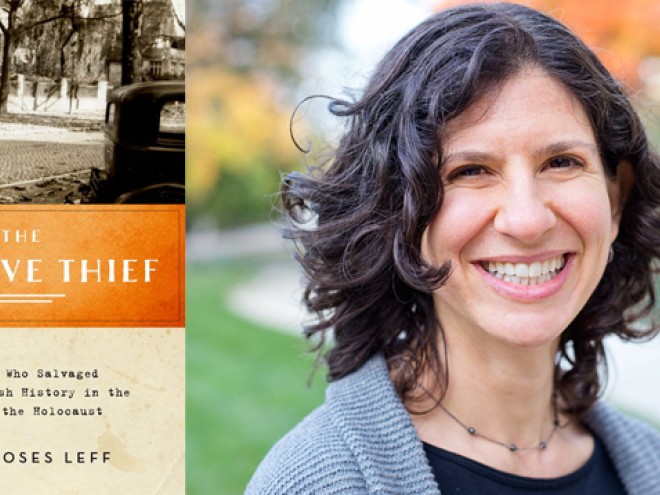 Eve Harris’s debut novel, The Marrying of Chani Kaufman, was published in April by Grove Press/Black Cat.
Eve Harris’s debut novel, The Marrying of Chani Kaufman, was published in April by Grove Press/Black Cat.
Shira Schindel: You’ve talked about your personal connection to Judaism and in particular your spirituality. Was some of the religious frustration you explored in the book also personal to you?
Eve Harris: Well, I am spiritual but I’m not religious, because it was not my upbringing. My father came to England when he was ten years old as a Holocaust refugee. My mom was born right after the war in Poland, and on both sides my grandparents were survivors. My father wasn’t in the camps, but he was in hiding. In the past I believe my family was religious, but we’re no longer a religious family because of these experiences, because of the Holocaust. My brother and I were brought up with Shabbos dinners and we kept major holidays, like Rosh Hashanah and Passover, but we were a very secular household. I was also brought up in West London, where there are very few Jewish people. I think that had an effect on me. I had to work hard to find Jewish friends, and to make sure to meet a Jewish partner. In some ways I think I missed out on a lot.
SS: Was it a culture shock for you to then enter the private Haredi girls’ school where you once taught English and Drama?
EH: Yes. When I got the job at this really religious school — which became part of the inspiration for the book — it gave me a fly on the wall view of a world that I would never have glimpsed if I hadn’t been teaching there. That year was truly transitional for me. I’m not saying I became more religious in the sense of keeping more observances; I didn’t, but it was fascinating.
As a teacher I was expected to dress according to Haredi Jewish custom while on school property. I got married that year as well, and once I was married I was expected to cover my hair on school grounds, which I did. It always felt a bit like playing Wonder Woman, because after school I would take off my hat, whip off my headscarf, and look like my normal self again. As I was going on the train toward my stop, away from the school, I would feel more and more relieved. I often felt like I was playing a part.
SS: In what way did that year inspire you to write this book?
EH: While I was teaching at the school I’d often walk with teachers into Golders Green, and people would tell me things. I soaked it up like a sponge. I had no intention of writing a book at that point, but I found it interesting and I just listened. Maybe it was easy for them to talk to me because I was an outsider. But there are no secrets in the book.
One thing I learned is it can seem very calm and perfect in this community, like everyone has their roles to play and behaves in a certain way. But there’s also a lot of frustration, and I wanted to write the book to reflect how human it was. Even underneath the veneer of perfection, even with the framework these individuals can fall back on when times are bad, it’s not easy there either, and these are just human beings struggling. I think it can be hard to see ultra-Orthodox Jews as people with the same types of human frustrations you experience. I’ve tried hard to give my characters depth, and to have compassion for them, so that they will seem real.
SS: Now that the book has been published, have frum (religious) readers reached out to you?
EH: When the book first came out there were some invitations to Shabbos dinners! One girl had gone to the school where I taught, and wrote to say that I had it spot on. We met for coffee. She’s not frum anymore. She said to me that while reading it she did a two-day cringe-binge. I had a few emails like that. Nobody likes a mirror being held up to him or  herself. But it’s not a documentary. It’s a book. A piece of fiction, and it’s supposed to be entertaining. So, make of it what you will.
herself. But it’s not a documentary. It’s a book. A piece of fiction, and it’s supposed to be entertaining. So, make of it what you will.
SS: What do you think Rivka would be doing now, a couple of years later?
EH: I think Rivka’s probably at home. It’s evening now in London. I reckon she’s got a really nice flat just a few miles down the road from her kids in Golders Green. And I think she’s making her evening meal. She still can’t bring herself to eat treif. She’s probably got the radio on, or her computer on. She might be working on something. I don’t think she’s back in the community, but I think she’s always got that pull-push with the community. I think she’s definitely got her hair down and she’s wearing some jeans! I don’t see her going back. She’ll never be the same person she was before she entered that world.
Shira Schindel is the head of Content and Acquisitions at Qlovi, an education technology startup accelerating literacy in K‑12 classrooms. She formerly worked in the literary department at ICM Partners, and studied creative writing at Columbia University.
Related Content:
- Eve Harris on the Visiting Scribe
- Reading List: Emerging Voices
- The Innocents by Francesca Segal



